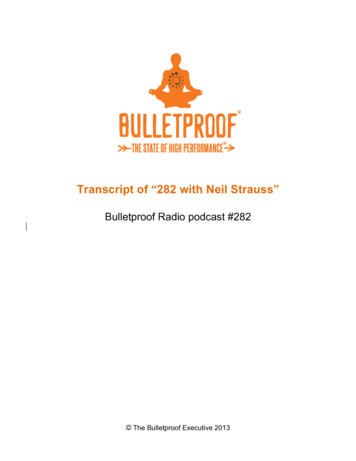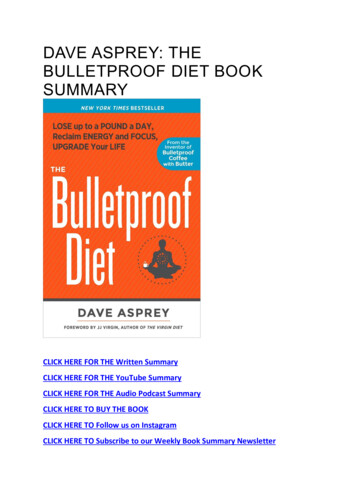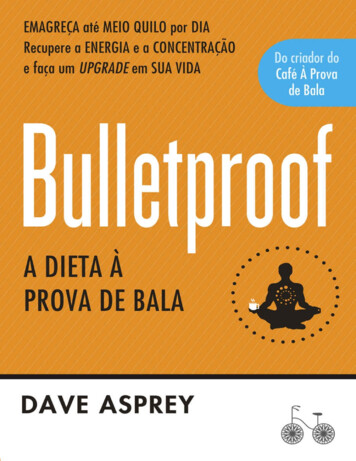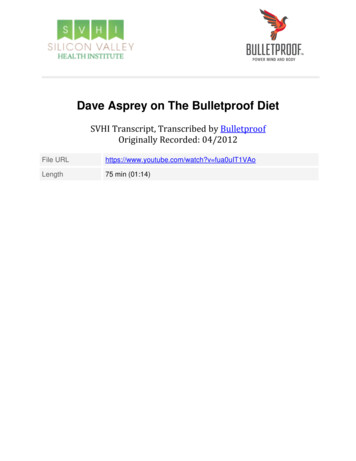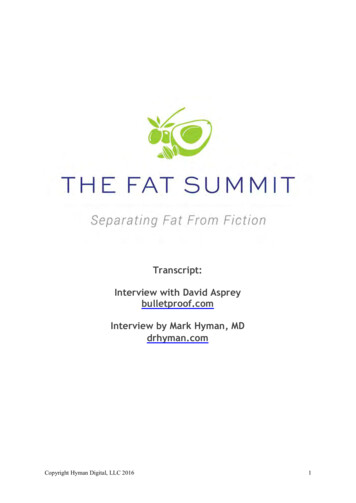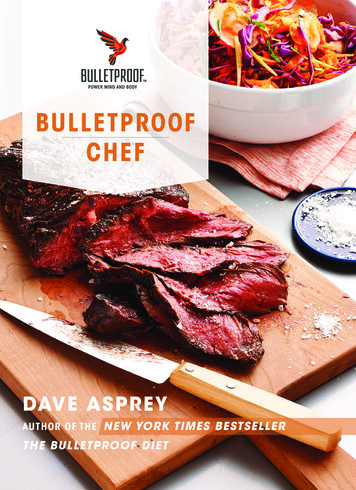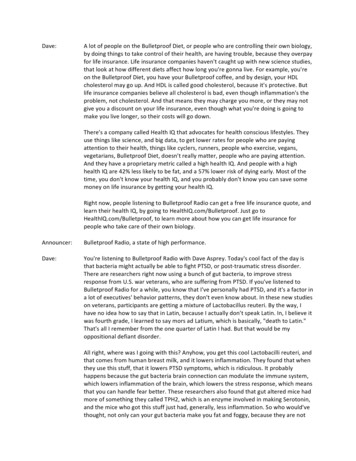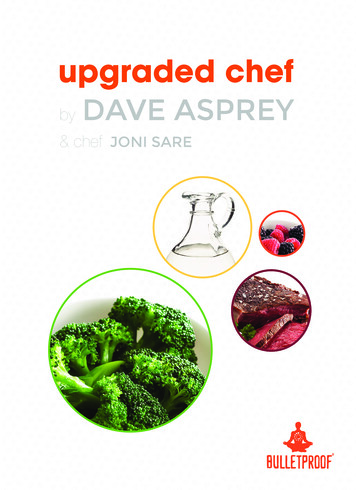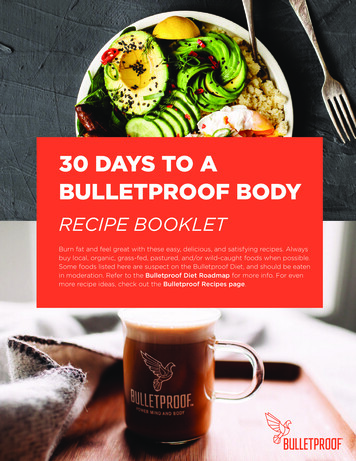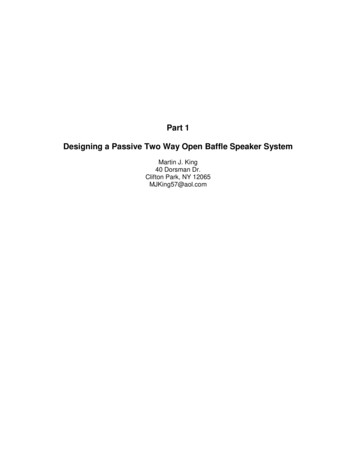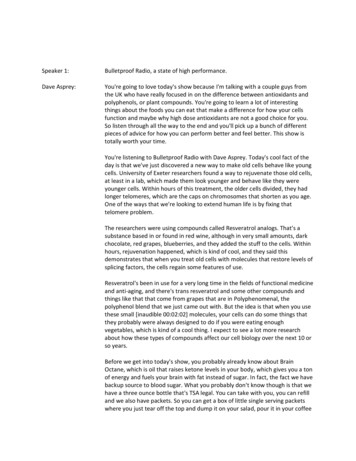
Transcription
Speaker 1:Bulletproof Radio, a state of high performance.Dave Asprey:You're going to love today's show because I'm talking with a couple guys fromthe UK who have really focused in on the difference between antioxidants andpolyphenols, or plant compounds. You're going to learn a lot of interestingthings about the foods you can eat that make a difference for how your cellsfunction and maybe why high dose antioxidants are not a good choice for you.So listen through all the way to the end and you'll pick up a bunch of differentpieces of advice for how you can perform better and feel better. This show istotally worth your time.You're listening to Bulletproof Radio with Dave Asprey. Today's cool fact of theday is that we've just discovered a new way to make old cells behave like youngcells. University of Exeter researchers found a way to rejuvenate those old cells,at least in a lab, which made them look younger and behave like they wereyounger cells. Within hours of this treatment, the older cells divided, they hadlonger telomeres, which are the caps on chromosomes that shorten as you age.One of the ways that we're looking to extend human life is by fixing thattelomere problem.The researchers were using compounds called Resveratrol analogs. That's asubstance based in or found in red wine, although in very small amounts, darkchocolate, red grapes, blueberries, and they added the stuff to the cells. Withinhours, rejuvenation happened, which is kind of cool, and they said thisdemonstrates that when you treat old cells with molecules that restore levels ofsplicing factors, the cells regain some features of use.Resveratrol's been in use for a very long time in the fields of functional medicineand anti-aging, and there's trans resveratrol and some other compounds andthings like that that come from grapes that are in Polyphenomenal, thepolyphenol blend that we just came out with. But the idea is that when you usethese small [inaudible 00:02:02] molecules, your cells can do some things thatthey probably were always designed to do if you were eating enoughvegetables, which is kind of a cool thing. I expect to see a lot more researchabout how these types of compounds affect our cell biology over the next 10 orso years.Before we get into today's show, you probably already know about BrainOctane, which is oil that raises ketone levels in your body, which gives you a tonof energy and fuels your brain with fat instead of sugar. In fact, the fact we havebackup source to blood sugar. What you probably don't know though is that wehave a three ounce bottle that's TSA legal. You can take with you, you can refilland we also have packets. So you can get a box of little single serving packetswhere you just tear off the top and dump it on your salad, pour it in your coffee
when you're on the road. I use this stuff when I travel, and so every meal I havesome Brain Octane, which completely removes my cravings and gives me anextra source of energy. So if you didn't know you can can take it with you, nowyou can. That's Bulletproof Brain Octane on Bulletproof.com.If you'd like to watch a video of this show, go to Bulletproof.com/YouTube andyou can check out pretty much the whole catalog here. If you'd like to leave areview, go to Bulletproof.com/iTunes. It will take you right to the show so youcan subscribe or you can say how cool it was because this is going to be a coolshow.Today's guests are Aidan Goggins and Glen Matten. This is two authors whowrite about some similar topics. Aidan wrote "The Sirtfood Diet", and Glennwrote "The Health Delusion". They're really influential parts of the internationalhealth and food discussion happening right now out of the UK. Aidan is apharmacist with a Masters Degree in Nutritional Medicine and Glenn has aMasters Degree in Nutritional Medicine, so these guys have spent a long timestudying this stuff.They work in fitness, sports nutrition and have worked with professional andOlympic athletes, and Aidan is officially ranked as one of the most influentialpeople in the UK food industry. So these guys have written a lot of cool stuffthat I've enjoyed, and I wanted to pick their brains today. So guys, welcome tothe show.Aidan Goggins:Hi David.Glen Matten:Pleasure to be here.Dave Asprey:All right. So Aidan, say something so everyone knows your voice.Aidan Goggins:Hi David. Great to be here. I'm looking forward to talking about more [inaudible00:04:17] cells survival pathways.Dave Asprey:All right, we can do that. And Glen, say something.Glen Matten:It's a delight to be chatting to you. I thought your preface with your fact of theday was the perfect intro to what us guys want to talk about.Dave Asprey:It might have been planned in advance. A full admission there. The idea here isthat you guys have really focused on some things like the sirtfood diet. Very fewpeople talk about sirt foods. In fact, let's just get into that. What is sirt?Glen Matten:Sirt is short for sirtuin, which refers to a family of genes that we all have. Thereare seven sirtuins within that family. It's an incredibly powerful activator withinour cells of a whole bunch of really beneficial, health promoting changes. All ofthe stuff you were talking about in your preface, we know that if we get the
right polyphenols, these plant compounds, into our diet they can actually beginto speak to our cells and activate this incredibly powerful family of genes, whichare being heavily researched for their longevity and disease prevention benefits.Dave Asprey:Glen, that's a fantastic way of describing it. You sort of got into this because youdescribe yourself as a foodie. How did you go from being a foodie into this field?Glen Matten:I've always enjoyed food and had that passion for food. Really, it's just like thelittle snowball that gathers momentum and gets bigger. Academically, I becamefascinated with the properties of food, the components of food. I think one ofthe things that makes the sirtfood diet just so compelling is that we're not tryingto isolate an individual component from food. We're really trying to usher in thisnew paradigm where we respect the complexity of food, and this really richtapestry of bioactive compounds, this huge vast array of polyphenols that ourfood contains. Really, when we start to look at what effect that has on a cellularlevel, these are incredibly potent signaling compounds that can have someamazing benefits.I think it's just the more you scratch away at the subject, I just think it getscompletely compelling, absolutely fascinating. I think with this appreciation thatwe need to get our nutrients primarily from food, and that there is this wholerich tapestry of nutrients that we're really not tuned in to. There's been so muchdebate around what vitamins we should have, this whole debate around macronutrients and how we manipulate those, the whole [inaudible 00:05:18] withcalories and this obsession with calories. And we've missed the massive part ofplant foods that are really influencing our health and that is going beyondmicronutrients, macronutrients, calories, and seeing that there is thiscomplexity to food that we're now beginning to understand. For me, that's mindblowing and something that I'm massively, massively excited about. I thinkwe're at the dawn of a new era, a new paradigm, of how we understand whyfood is good for us and why certain plant foods are incredibly good for us.Dave Asprey:You talked about plant foods here. What about some of these animal foods?Things like [inaudible 00:07:57]containing krill oil or some of the other thingsthat are present in butter, grass fed animal fat? Are those a part of the storyhere?Glen Matten:Absolutely. I think we're on no level saying we should only be eating plants. But Ithink it's making sure that plants have their rightful place alongside these otherfoods. We're not advocating vegan diets. We've actually got no particularperspective on that really. I think protein's very important. I think certain fattyacids are very important that we would find in fatty fish. I think it's aboutgetting the best from the animal kingdom and the plant kingdom and bringingthose together into a complete diet. We've got no sort or real agenda on thatlevel, and we respect that people eat in diverse ways and it might bepescaterians, it might be people who enjoy and eat meat.
We're trying to bring the debate a bit further and say whatever way you eat, interms of your intake of animal foods, if we can really harness the power of theseplants alongside that, that's where health comes from. It's not through havingmeat or avoiding meat or having fish or avoiding it. It's about the integration ofthese plant foods in whatever diet that your preference leads you to. It's theintegration of these very powerful polyphenols which [crosstalk00:09:24]change our genes.Aidan Goggins:I think it's almost like how I explain it to the athletes I work with. It's that thecalories and the macros are the fuel of the cells and you mentioned it yourself Ithink in the products you sell. With the right type of macros and right type offood that you're eating, you can take the fuel you're eating from standardunleaded to high octane.Dave Asprey:Exactly.Aidan Goggins:And it's so important and so vital but we just can't look past the key essentialpart which is what maintains the function and the health of the cells. And that'swhat these polyphenols do. They repair and they eliminate the damage to ourcells. They allow us to use the high octane fuel much more efficiently so you getthe best of both worlds.Dave Asprey:If you are not eating a lot of plants, you're doing it wrong. I think that's a corething that all of us agree on. There's always questions, people saying should youdo something else, and what I find is that a lot of vegans and vegetarians don'teat that many actual plants. They're eating plant seeds and lots of starchycarbohydrates and maybe not a lot of colored compounds. You get a lot ofstandard diet eaters who just eat a bunch of processed stuff with nopolyphenols in it. You end up with this idea that few of us are eating enoughplants and then, what do you put on the plants?Aidan, you came at this differently. You became a pharmacist and nutritionistbecause you had your own disease that you needed to hack. Walk me throughwhat happened there.Aidan Goggins:I initially qualified as a pharmacist. I worked in the pharmaceutical industry andas a community pharmacist for five years. Then, overlapping with this, I also dida Masters in nutritional medicine and I'm proud to say, in nutritional medicineresearch and clinics. The driving force for that was I had an autoimmunedisease. It was undiagnosed in earlier life and then in later life it lead to a lot ofissues.So I was half blind in one eye, I had six operations, every MRI showed hugeinflammation that the consultant wasn't able to bring down, hence theoperation repeats. I went to every single nutritionist as well, and I wasn't able toget much success. So alongside the consultant I was working with, we reallytook it on as a personal project and discovered basically the intricacies and the
overlap of nutrition and medicine. In my case, it was actually a yeast problemwhere I had from birth a fungus inducing what's called Graves Disease, anautoimmune thyroid disease, and the thyroid burned out and then actuallycaused hypothyroidism and a lot of complications due to that. But now theinflammation on the last MRI is fully rescinded and now I am able to say I feel inthe best health I ever have and it's fully under control. And that is true: medicalknowledge employing the nutritional medicine values of food and just knowinghow to incorporate them properly.Dave Asprey:So I'm assuming the yeast you had was candida?Aidan Goggins:No actually. It wasn't. It was brewing yeast. It was a rare condition. And it wasactually researched in Israel, one of the endocrine hospitals there did the initialresearch on it. Autoimmune diseases can be induced by [inaudible00:13:03]Basically it means, no more beer for me.Dave Asprey:So basically you have beer allergy that triggered all of your problems?Aidan Goggins:Beer, bread allergy. Yeah baking and brewing yeast basically. I was going everysingle day and invoking it and that caused a lot of knock down effects. It was theknock down effects that really caused the issues.Dave Asprey:It's kind of astounding if you look at Pub Med which is an online resource ofmedical papers, and you look up saccharomyces cerevisiae which is Brewer'sYeast or baker's yeast or nutritional yeast as they like to call it [crosstalk00:13:35]Aidan Goggins:ExactlyDave Asprey:It is associated with cancer way more than you'd like to see and it is one of thethings on the Bulletproof Diet that is not on the green zone and is in the verybottom of the suspect foods list almost to the don't eat it list because it oftencontains MSG as well. So a lot of people are like, oh it has B vitamins thereforeI'll take it. There's better sources of B Vitamins. It's called liver. But that's justme.Aidan Goggins:That's it. It gets touted so often. I remember I went back home and I was like, tomy mother, and I said so we discovered what it was because we done actually aprovocation test where we done a pre MRI, took the yeast, done another MRIand then we moved it for two weeks, done another MRI and were able to seethe changes in inflammation. My mother turned around and goes, "Oh! Thenutritionist told me that that was really good for the brain and for developmentso I had that every day when you were pregnant. You were actually born with ayeast infection but the doctor said it was fine." That's valuable information.Dave Asprey:My take on this, is that you guys are looking at cell level biology so you knowwhat mitochondria are. They're the power plants in the cell, the subject of my
last book "Head Strong". These are bacteria. What do bacteria hate? They hateyeast and fungus because they're competing fo
Dave Asprey: If you are not eating a lot of plants, you're doing it wrong. I think that's a core thing that all of us agree on. There's always questions, people saying should you do something else, and what I find is that a lot of vegans and vegetarians don't eat that many actual plants. They're eating plant seeds and lots of starchy carbohydrates and maybe not a lot of colored compounds. You .
